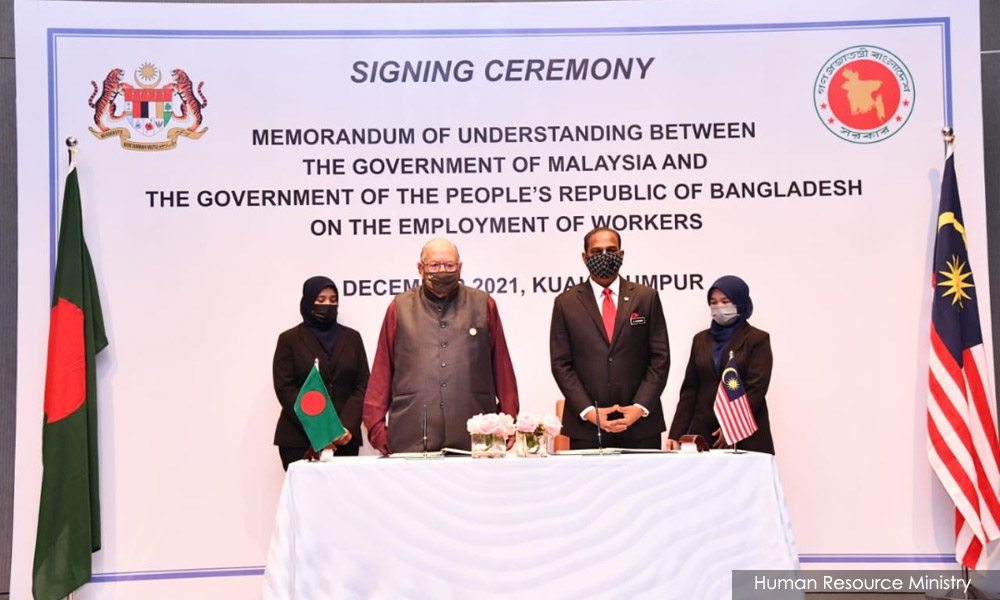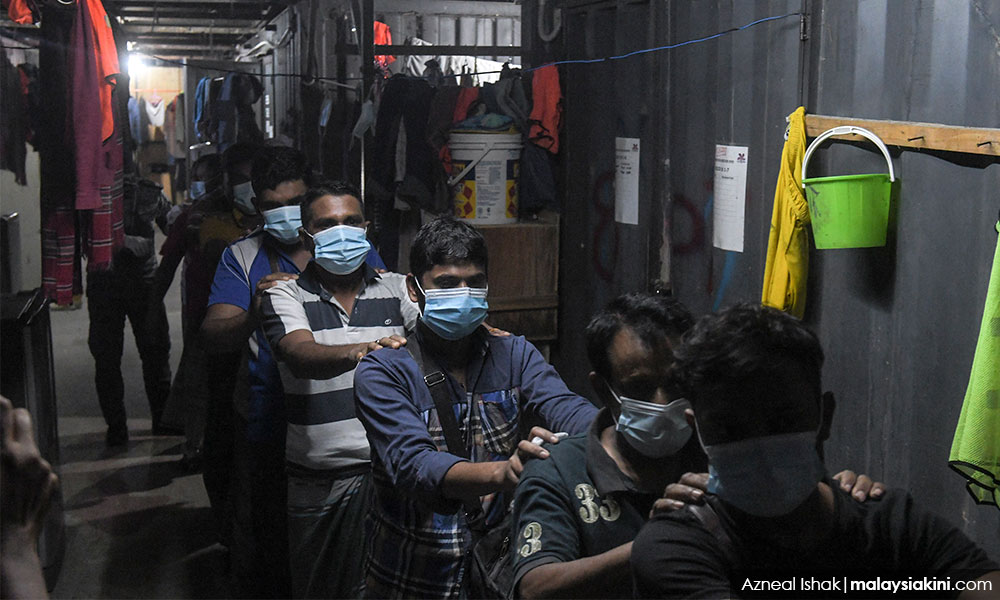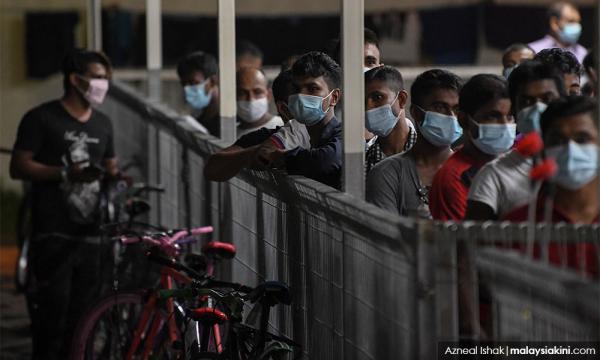COMMENT | The memorandum of understanding (MOU) between the governments of Malaysia and Bangladesh on the employment of workers was inked on Dec 19 last year, after months of preparations and consultations.
Yet, many pressing issues remain unanswered.
Why the cloud of secrecy?
It is difficult to understand why the MOU - a document that would impact thousands of workers and employers - was shrouded in secrecy. It did not have the benefit of robust public discussion among all stakeholders, including employers, workers’ organisations and civil society organisations that have engaged with migrant workers for decades and - most importantly - workers themselves who should be one of the main beneficiaries of the MOU.
Comments on the MOU can therefore be based only on media reports and leaked drafts of the MOU, which in itself reflects poorly on the state of affairs in the recruitment and management of foreign workers.
Doesn’t the Employment Act apply to Bangladeshi workers?
Appendix 1 of the MOU provides a sample contract of employment. Among other provisions, it makes mention of wages, working hours, overtime, rest days public holidays, annual leave, deductions (from wages), accommodation and sick leave.
While at first glance this looks impressive, it is apparent that all of these are in fact nothing more than what is already the Employment Act 1955 (EA). Would it not have been more practical to simply state that the employment contract shall be in compliance with the EA, which also includes many other clauses in addition to the ones mentioned above?
Does it mean that the provisions not mentioned in the sample contract would not apply to the migrant workers?
Bonded to the employer
Clause 17.2 of the MOU stipulates that the worker shall not change employment during the period of his employment contract. However, this stipulation does not address two important issues that have become apparent in the past.

I. If the employer does not comply with his part of the contract, eg, not paying wages in full or in part, subjecting the worker to an abusive work or living environment, what options does the worker have?
Of course, the worker can opt to leave his employer, but that would make him undocumented if he chooses to work for another employer. At the same time, he would most probably not want to return home, given that he would invariably have debts to repay, incurred during the recruitment process.
Shouldn’t the worker be permitted to work elsewhere if the first employer is clearly in breach of the contract? Sending the worker home is tantamount to penalising him for the misdeeds of his employer. The MOU does not address this very real concern that many migrant workers face.
II. There can be other reasons why a worker may want to change his employer, such as he may find that he is unsuited for the job, he may suffer allergic reactions from that particular work environment, he may be able to earn more working for another employer, etc.
However, the worker is not permitted to change employer and is bonded to his original employer, which may give rise to allegations of bonded labour. It is of course one of the conditions of the work permit imposed by the Immigration Department that the worker cannot change jobs, but that is not a good enough reason for this issue to be ignored during the lengthy deliberations leading to the signing of the MOU if workers’ interests are taken into consideration.
For example, the original employer’s interests could have been safeguarded by making provisions in the MOU for the new employer to compensate the first employer for all expenses incurred during the recruitment process.
The easing of the restriction on migrant labour mobility among workers - in a regulated manner - would have the effect of incentivising employers to take good care of their workers, instead of exploiting their “bonded” status, as some employers are known to do.

No avenue for appeal
Clause 17.3 of Appendix A stipulates that if the worker is found by “the competent authority concerned creating social problems (sic)… the worker shall be dismissed from the job and shall be repatriated to Bangladesh at the worker's own expenses”. This may seem reasonable at first glance, but the practical application of this provision may be more complicated.
For example, what is “the competent authority” being referred to? Would an in-house domestic inquiry qualify as “the competent authority”?
There is no provision for the employer to refer a worker to the Labour Department for “creating social problems”. Therefore it would seem that it is very much up to the employer to unilaterally decide if the worker is indeed guilty of the offence, with no recourse for appeal.
One would have expected the MOU to spell out in some detail how this provision is to be operationalised in order to ensure that the decision is made by an independent body, and there is an avenue for appeal against capricious decisions.
Recruitment fees
One of the most current issues involving migrant workers is the huge costs incurred by migrant workers during the recruitment process.
As such, one would have expected the MOU to address this issue boldly and clearly in a comprehensive manner to ensure the Bangladeshi workers are not exploited by rapacious recruitment agents and that their employers in Malaysia comply with globally accepted best practices on recruitment fees without laying themselves open to charges of practising forced labour and debt bondage.
Appendix B of the MOU only states that the employer is responsible for the service fee payable to the Malaysian recruitment agent, in addition to sundry payments such as visa processing, medical insurance or Sosco premiums, medical examination in Malaysia, Covid-19 tests, air ticket from Malaysia and security deposits as required by the Immigration Department.
Furthermore, clause (vi) states that “the employer may advance such payment (emphasis added) and shall be allowed to deduct not more than 50 percent from the worker’s monthly wages for all types of deductions to recover such advances.”
The juxtapositioning of this clause to the earlier one on fees and the reference to “such payment” is disturbing and seems to suggest that the worker is somehow going to end up paying these fees, albeit in instalments.
Additionally, three of the items mentioned above, viz immigration security clearance, biomedical test and Covid-19 tests will only be paid by the employer if the worker qualifies for the immigration security clearance process and biomedical test in Bangladesh. The unanswered question is whether the worker would get a full refund of whatever fees he would no doubt have paid until then.
On the other hand, it is clearly stated in the MOU that the worker shall bear the expenses for the recruitment costs incurred in Bangladesh. It is a well-known fact that most Bangladeshi migrant workers incur debts of up to RM20,000 in Bangladesh to obtain a job in Malaysia, yet the MOU has absolutely nothing to say about how this blight on the recruitment process should be dealt with by the governments of the two countries and the employers.
This is not only a serious defect in the MOU, but it misleads employers into believing that mere compliance to the MOU would be sufficient to absolve them from charges of forced labour, with a serious consequence on the export of their goods, as a number of companies have discovered.
Family members not allowed to visit?
The MOU states quite unambiguously that the “worker shall not be allowed to bring his family members during their period of employment in Malaysia”. Why shouldn’t the worker be allowed to have his family members over for a social visit to Malaysia if he so wishes? This stipulation is simply disrespectful of the worker as a human person and should have no place in the MOU.

Selection of Bangladeshi recruitment agents
The MOU states that the government of Malaysia shall select Bangladeshi recruitment agents (BRA) automatically through the online system from the list provided by the Bangladesh government.
This begs the question: Why is the Malaysian government getting involved in the selection of BRA and on what basis is the selection made?
Based on past experiences, the most obvious answer is that the parties involved in the selection of the BRA would have a vested interest in the selection process. If indeed that is the case, the officials concerned would hardly be in a position to exercise their oversight and regulatory function objectively.
No protection for workers
It is expected that any MOU between the two countries on the recruitment of migrant workers would put in place clear mechanisms to ensure that workers (who are the most vulnerable group among all parties concerned) are adequately protected.
Surely both governments are not unaware of the multitude of labour and human rights violations as well as fraud and deception that workers face during the recruitment process as well as during their period of employment in Malaysia, until their repatriation.
These include false promises, deception, abusive work and living conditions, wage theft, lack of social security protection, non-renewal of work permit, cheating by pseudo employers (recruitment agents posing as employers and getting work permits for non-existent jobs), etc.
Unfortunately, the MOU signed on Dec 19 completely fails to address any of these issues. It does not provide for any significant improvements in the recruitment process, but merely maintains a system that has proven to be hopelessly flawed.
It provides no protection for the worker against exorbitant recruitment costs. Protection for the worker during his period of employment is provided for by nothing more than what is already afforded by current labour legislation and regulations - which experience shows is often not adequately enforced while remedies are not readily accessible by the migrant workers.
There is no attempt to address the various labour violations and abuses which migrant workers in Malaysia routinely undergo.
What about justice for victims of failed govt programmes?
While much has been made about the MOU, a more basic question has been studiously avoided by both governments.
Why is there a need to recruit new workers from Bangladesh when there are already thousands, if not millions of Bangladeshi workers in Malaysia who are technically undocumented and are being coerced to return home through threats, arrests and detention by the Immigration Department?
At least half a million of these migrant workers are in fact victims of failed government programmes for rehiring and legitimising their immigration status, who have paid thousands of ringgit to government-appointed agents.
It is only fair and sensible that these workers, who are already proficient in our language and familiar with our way of life, be given the option to work legally in Malaysia without having to make any more payments.
This should be done before new workers with scant knowledge of our language, customs and work systems are recruited. The fact that this is not being done can only be explained by following the money trail.
Additionally, there are thousands of workers who had gone on home leave before the outbreak of the Covid-19 pandemic and are now languishing in Bangladesh, waiting to come back to resume their jobs. Shouldn't these workers be given priority and enabled to return to their jobs without any payment?
JOSEPH PAUL MALIAMAUV is the director of Tenaganita, a human rights NGO that promotes and protects the rights and dignity of migrant workers and refugees.
The views expressed here are those of the author/contributor and do not necessarily represent the views of Malaysiakini.


